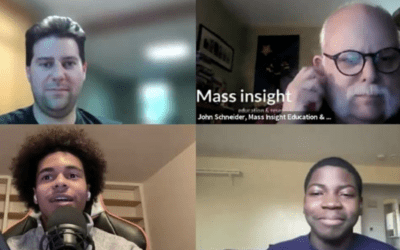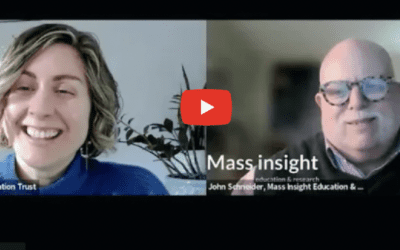The Boulder Fund grant will allow Mass Insight to pilot a new program targeting middle school readiness. May. 22, 2025 –Boston– Mass Insight Education & Research’s President and CEO, Andrea Wolfe, has been selected in the 2025 cohort of Education Leaders of...
Gateway to College Success Network: Strengthening the ties between middle and high school teachers
It’s a tall order and one that MIE has embraced. That is, increasing the collaboration and information flow between middle and high school teachers. We believe that if we strengthen collective inquiry among teachers in grades 6 to 12 with an aim of aligning instructional practices then learning will accelerate and an increase in college readiness for all students will prevail. We are clear about our intended outcomes, where the waters get murky is how we make it happen. Darling-Hammond (2014) posits that in order for our educational system to prepare all students to be college ready it must be coherently aligned and foster collaborative change within an innovative learning system. In so doing, we will transform our schools for the future.
MIE’s interest in understanding how to support aligned instructional practices 6 to 12 was born out of our Advanced Placement (AP) work across Massachusetts. Although access to AP classes has shown dramatic improvement among our partner districts during the past decade, in recent years the trend began to plateau in terms of the numbers of students ready to take AP coursework. In conversations with school and district leaders, it was concluded that although the curriculum was aligned across a district, instructional practices were not. Thus, in an effort to improve instructional alignment grades 6 to 12, MIE applied for and, in July 2016, awarded a two-year grant from the Mass Teaching and Learning Network (MassTLN) to build Networked Improvement Communities (NICs) within and across five Gateway City Districts including Worcester, Fitchburg, Springfield, Holyoke, and New Bedford.
You may be asking, what is a Networked Improvement Community (NIC)? The basic idea behind Networked Improvement Communities, according to Bryk et. Al (2015), is that if we can engage enough minds and hearts working in a disciplined fashion on the same problem, and create mechanisms for learning from each other, then we can improve more quickly. My colleague and lead researcher for the Gateway to College Success Network, Brett Lane, came up with a metaphor for understanding NICs in real life and in so doing, clarified the potential NICs have in improving instructional practices.
Brett’s son loves to play video games. In fact, he’s very good at them and usually beats a new game in about two weeks’ time when working on his own. However, if Brett’s son and one of his friends work together to beat a new game, they can do it much more quickly. They learn from each other mistakes, share insights, and encourage each other, typically beating a new game in less than one week’s time! But, what’s even more impressive is when Brett’s son and his video-game-loving friends use online discussion boards and networks of other games to beat a game. Utilizing this collective wisdom of his friends and the online community, Brett’s son can beat a new video game in only a few hours’ time.
As the hub for the Gateway to College Success Network, MIE is the network convener, thought partner and capacity builder. We are not bringing in new strategies or approaches; rather, our work is layered upon existing district initiatives and strategies. Standard and customized data collection strategies will be used to measure the progress and impact of the work in and across districts. In so doing, MIE will uniquely support each of our five district’s NICs in hopes of achieving aligned instructional practices as expediently as Brett’s son and his friends were able to break the video game-code through their collective efforts. In addition, we will cultivate sharing among districts to accelerate the spread of effective practices.
Follow our Gateway to College Success Network monthly blog posts to learn about the work of our five Massachusetts districts as teachers and leaders forge the way in building and engaging with NICs as we will spotlighting one district each month as they prepare for, launch and engage NICs within their district. Four of the five districts are focusing their NICs on aligning instructional practices within science or math, while one district is taking a deep dive into improving aligned instructional practices in English language arts.
Megan English, Instructional Manager, MIE, and Samantha Kearney, master’s candidate, Harvard Graduate School of Education, also contributed to this post.

Recent Posts
Cybersecurity Event Introduces Students to Cyber Careers
For the 5th year in a row, Mass Insight Education & Research is hosting the Cybersecurity and You Workshop to introduce Advanced Placement® (AP) STEM high school students to cybersecurity scenarios and concepts as well as postsecondary education and career paths....
Adolescent Literacy Crisis: IES Guide In Action – Webinar
What does the evidence say about how schools can improve the adolescent literacy crisis happening in our country? In this webinar, we explore the Institute of Education Sciences Reading Intervention Guide for Grades 4 through 9, found here, and diving into two of the...
You may also like
An Interview with Mass Insight AP Students and their Teacher
https://youtu.be/mQTeW8-sX40 We sat down with two Mass Insight AP STEM & English Program students, Ben and Chris-Ander, and their teacher, William Pellegrino, to hear about their educational journeys, their experiences in AP classes and as vocational students, and...
An Interview with Kristen Hengtgen of The Education Trust
https://youtu.be/1ZfxNShHJOU?si=d1a1GoVrgrDWT5Cu Kristen Hengtgen, Ph.D. is a senior analyst on The Education Trust's P-12 policy team and co-author of their new report, Increasing Access to Advanced Coursework in Massachusetts. In this interview, she joins Mass...
Creating the conditions for greater success of systemically disadvantaged students in AP: Next steps for the Massachusetts AP STEM & English program
Recently the New York Times published an article entitled, Why is the College Board Pushing to Expand Advanced Placement? The article focuses on an important issue: there’s been greater growth in AP participation for Black and Latino students and students living in...



